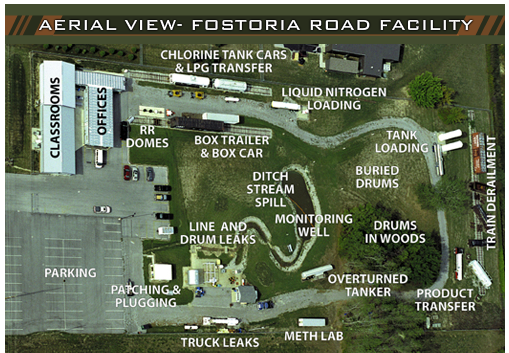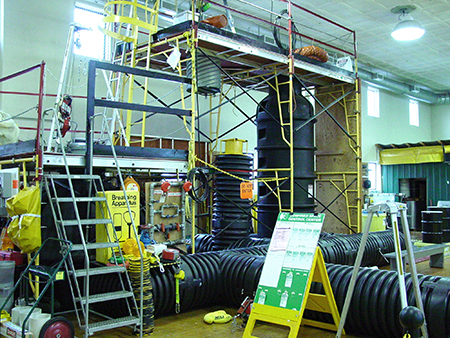 All-Hazards Training Center - Off Campus
All-Hazards Training Center - Off Campus
Utilized by students and professionals in the field, this training center boasts major real-life training props such as:
- Railcars
- Tank trucks
- Box trailers
- Intermodal containers
- Storage tanks and piping
- Hazardous materials and fire simulators
- Monitoring wells
- Ditch and functioning streams
- Pond sediment and water sampling
Findlay All Hazards training is based on the kinds of incidents that emergency responders face in the real world. We deliver coursework through a variety of methods, including tabletop and full-scale field exercises that incorporate the latest available technologies and equipment. Trainees get the opportunity to practice tasks like:
All-Hazards Training - On Campus Renninger Center
 The Renninger Training Center on main campus features a large interior space for training in OSHA requirements, confined space entry/rescue, personal protective equipment, personal decontamination and other topics. Students gain experience using a confined space training station, decontamination tent and hazardous materials storage.
The Renninger Training Center on main campus features a large interior space for training in OSHA requirements, confined space entry/rescue, personal protective equipment, personal decontamination and other topics. Students gain experience using a confined space training station, decontamination tent and hazardous materials storage.
Ventilation Lab
The EHS and Sustainability ventilation teaching lab, one of the few in the in the United States, was reconstructed and upgraded with a grant from BP-Husky in 2014. The teaching lab allows students to test and validate ventilation systems commonly used in industry. According to OSHA, 70% of occupational exposure is due to inadequate ventilation. This makes students who have knowledge of ventilation sought after in ESH industry.
"Green" Houses
University of Findlay operates two student houses that receive more than 70 percent of their power from alternative energy sources. Established in 2011 through a grant from BP to Findlay, the houses receive power from solar panels and a wind turbine located on the property. Now in their third year as a student project, UF's "green" houses have made the entire student population more environmentally aware. The small wind turbine can be seen from Findlay's North Main Street and also serves as a reminder to the community to decrease its reliance on fossil fuels.
EHS and Sustainability Student and Faculty Research Lab
Constructed in 2016 with grants from Marathon Petroleum and G2 Revolution, Findlay's student and faculty have access to a cutting edge research lab. This lab houses a variety of equipment and has space dedicated to multiple research projects.
Smog Chamber
The air is very clean in Findlay, which is good news for its citizens, but makes any research and experiments into air pollution attempted by EHS and Sustainability students a bit anticlimactic and not in line with the hands-on experience that Findlay seeks for its students. Thus, assistant professors in the EHS and Sustainability program have constructed an indoor smog chamber in the Research Lab located in Frost/Brewer Science Hall. The chamber uses two sets of capped ports. One port is used to inject certain pollutants which are mixed together and dispersed within the chamber, and the other sampling port connects instruments that can measure the atmosphere inside without going in and being exposed to the polluted air. Once the research is completed, the air is exhausted at a very low and harmless concentration out of existing lab exhausts. There are safety measures included, so the advantages of a controlled environment are always there. Additionally, since the indoor chamber uses more concentrated ultra-violet light, reactions often happen much more quickly than they do in the environment. This allows research to be done in a time-sensitive classroom and/or lab environment.
Biodiesel Fuel Converter
Working with Columbia Gas of Ohio, the University of Findlay has acquired a 30-gallon biodiesel converter. Students have the opportunity to work with this piece of equiptment through labs and immerse themselves in the promising and important future of renewable energy.